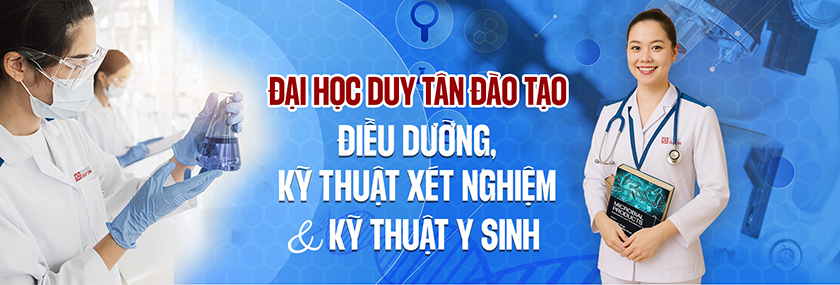
In every single country in the world, the health sciences receive attention, care, and investment to ensure the well-being of the people and give them the energy and happiness necessary to contribute to national development. Universities that offer training in the health sciences therefore often treat them as a central focus. At DTU, the programs in:
- Nursing,
- Medical Laboratory Technology, and
- Biomedical Engineering,
are given optimal conditions in terms of facilities, teaching staff, and collaborations to train highly qualified professionals in service of society, thus helping to address the challenges of an aging population and keep pace with rapid advancements in science & technology. Students who choose to pursue these majors at DTU reap many benefits after graduation, from promising career prospects, both in Vietnam and abroad, and especially in Japan with opportunities for employment and corporate internships with full financial support.

Several Japanese and German corporations and organizations - the Japan Medical Association, Suganuma Group JSC, Mother Brain JSC, Route Inn Japan JSC, ICO International JSC - regularly visit DTU to offer career counseling and job placement for DTU students of Nursing. This is urgent in many countries around the world due to their aging populations.
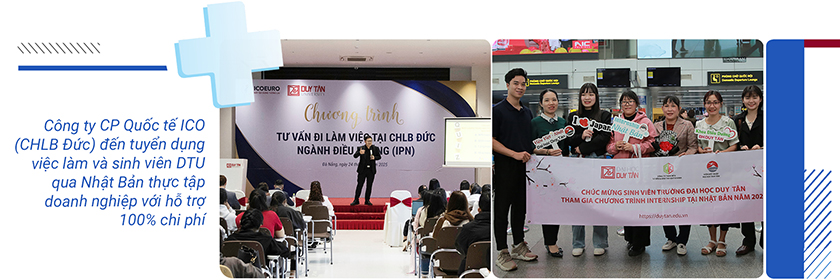
One notable partnership is with the Japanese Glome Management Group, which has actively supported DTU with medical equipment for training and research. Glome Management donated two Japanese-standard nursing-skills practice rooms worth hundreds of millions of VND, equipped with specialized nursing equipment: homecare and hospital beds, anti-decubitus mattresses, RKW-302 trolleys, Cole Mat C hyper (MSN1200) HCH-1, KT-95HD Naturals, and MY-22258 infusion poles.
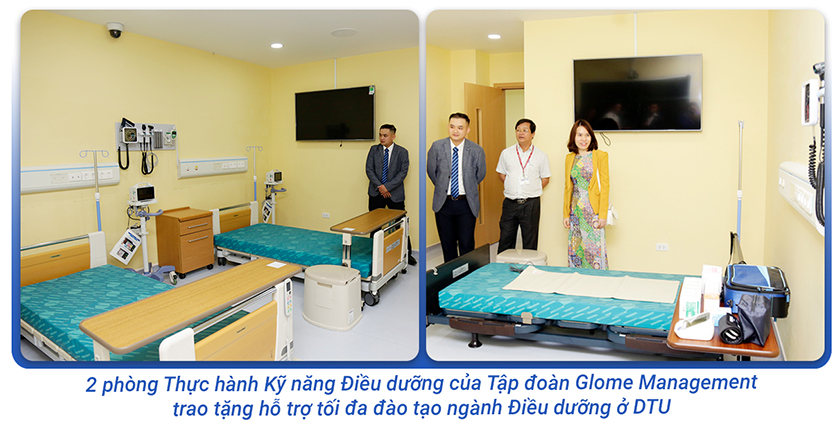
Committed to delivering high-quality human resources, DTU consistently partners with reputable universities and businesses to enhance its training programs - with many good results over the years. The university has agreements with various organizations and businesses to improve education in these fields, with Japanese institutions like
- SEIREI Social Welfare Group,
- Glome Health Group, and
- the Japanese National Council for Elderly and Blind,
and many big medical universities around the world, such as
- University of Pittsburgh (UPitt): 7th best university by medical research in the US according to the National Institutes of Health (NIH),
- University of Illinois at Chicago (UIC): largest-scale training in medicine & pharmacy in the US (in terms of number of both students and majors),
- Duke-NUS Medical School (Singapore): Southeast Asian leader in public and community health,
- Ben-Gurion University (Israel),
- Burapha University, Khon Kaen University, and Mahidol University (Thailand), and
- Dong-A University (South Korea).
Nursing students at DTU benefit from access to advanced knowledge and to modern and most up-to-date equipment. Many students furthermore have the opportunity to work and do internships in Japan with their expenses fully covered already while still studying.
These students are highly regarded by recruiters for their specialized knowledge and professional skills, both during interviews and while working or doing internships abroad. Notable examples include:
- Truong Thi Hoang My, Nguyen Thi Thao Van, and Phan Duc Anh Tuan working at Sennan Sanatorium,
- Le Thi Thanh Nga and Le Thi Thu Ha working at Sato Hospital,
- Nguyen Thi Diem My and Le Thi Thu Trinh working at Kawasaki Hospital,
- Huynh Thi Bich Chieu and Dinh Thi Quynh Luu working at Isino Hospital,
- Nguyen Duc Hoan My working at Shinken Kougyo JSC,
- Nguyen Thi Doan Trieu Man and Tran Thi Thuy Tien doing internships at Shinken Industry JSC,
- Kieu Anh Sang doing an internship at Yutokukai Medical Corporation,
- Nguyen Thi Hoai doing an internship at Sompo Care,
- Nguyen Le Dieu and Le Thi Thanh Tham doing internships at Ocean Care Work.

Medical tests play a vital role in healthcare, with studies showing that they influence 70% of medical decisions, with nearly 100% of rational medical decisions based on accurate and consistent test results. Recognizing this, DTU has invested heavily in building a team of reputable, highly qualified lecturers in this field.
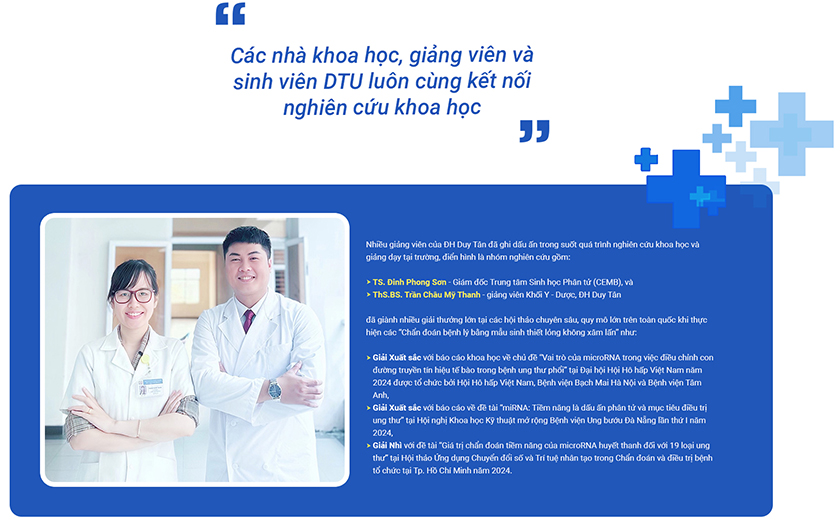
A difference at DTU is that students in these programs can participate in scientific research under the careful guidance of university staff and researchers.
- After completing the 4-year program, graduates of Medical Laboratory Technology have a solid foundation of scientific and medical knowledge and extensive knowledge and skills in clinical medicine, preventive medicine, and community health. They are able to do scientific research and to improve their capabilities on their own, and they possess the ethics, spirit, confidence, and creativity needed to engage and work in an international environment.
- After completing the 4.5-year program, graduates of Biomedical Engineering have extensive expertise related to electronics, medical physics, medical devices, and current foundational technologies in healthcare, as well as knowledge and skills relevant to biomedical engineering - to meet the high-quality human-resource standards of the industry. DTU students of Biomedical Engineering furthermore develop their professional skills related to medical development and production, such as with biocompatible prosthetics, medical devices, diagnostic equipment, and imaging devices like ultrasound, X-ray, and CT. DTU has developed a thorough training program that ensures Biomedical Engineering students are fully equipped with basic knowledge of chemistry, physics, and biology, and with specialized knowledge and skills in bioinformatics, diagnostic & imaging processing, physiological signal processing, biomechanics, biomaterials, physiological systems analysis, and 3D modeling in healthcare.
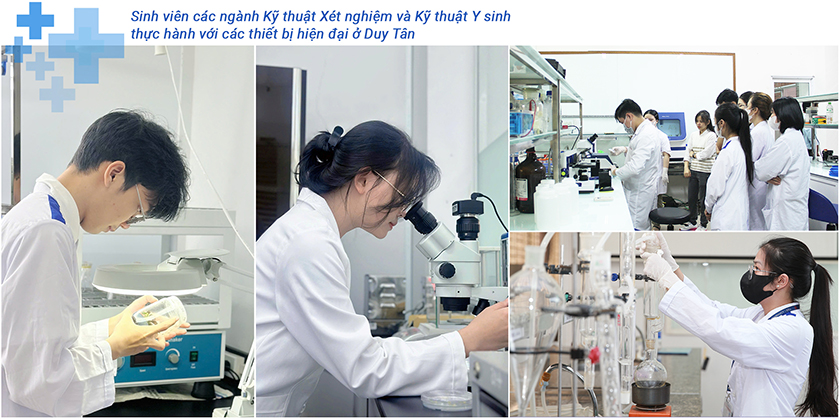
Specifically, there are incredibly broad job opportunities for students of both Medical Laboratory Technology and Biomedical Engineering due to the strong development of science & technology and of financial resources, and the growing public awareness of preventive health practices, which have led to greater demand for medical services have enabled many hospitals to import a range of modern medical devices. However, there is currently a significant shortage of skilled personnel who can operate these technologies effectively and interpret complex medical data.
DTU has established several specialized centers for technical support and service development for both afore-mentioned disciplines:
- Center for Advanced Chemistry (CACE),
- Center for Molecular Biology (CEMB),
- Center for Electrical Engineering (CEE),
- Center for Mechanical Engineering (CME),
- laboratories and practice rooms of the DTU College of Medicine & Pharmacy (CMP),
- Medical Simulation Center (MedSIM),
all of which offer a range of modern equipment for teaching, learning, and research.
(Media Center)